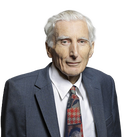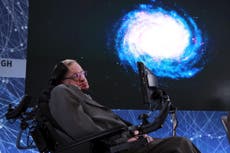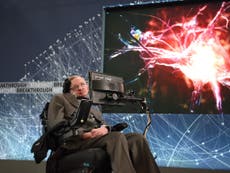I first met Stephen Hawking when we were students. His parties were legendary and he always insisted he wasn't another Einstein
A Marilyn Monroe lookalike cut a huge birthday cake; a troupe of can-can dancers performed; there was music and singing. When the week’s events were all over, he celebrated with a trip in a hot-air balloon. And that was just his 60th

Soon after I enrolled as a graduate student at the University of Cambridge in 1964, I encountered a fellow student, two years ahead of me in his studies; he was unsteady on his feet and spoke with great difficulty. This was Stephen Hawking.
I learnt that he had a degenerative disease – amyotrophic lateral sclerosis – and might not live long enough even to finish his PhD. But, amazingly, he lived on for more than 50 years. Mere survival would have been a medical marvel, but of course he didn’t merely survive. He became the most famous scientist in the world – acclaimed for his brilliant researches; for his bestselling books about space, time and the cosmos; and above all, for his astonishing triumph over adversity.
Within a few years of the onset of his disease he was wheelchair-bound, and his speech became an indistinct croak that only those who knew him could interpret. But in other respects fortune favoured him. He married a college friend, Jane Wilde, who provided a supportive home life for him and their three children.
His scientific work went from strength to strength: he quickly came up with a succession of insights into the nature of black holes (then a very new idea) and how our universe began. In 1974 he was elected to the Royal Society, Britain’s main scientific academy, at the exceptionally early age of 32.
He was by then so frail that most of us suspected he could scale no further heights. But for Stephen, this was still just the beginning. He worked in the same building as I did. I would often push his wheelchair into his office, and he would ask me to open an abstruse book on quantum theory – the science of atoms, not a subject that had hitherto much interested him.
He would sit hunched motionless for hours; he couldn’t even turn the pages without help. I wondered what was going through his mind, and if his powers were failing. But within a year he came up with his best ever idea, encapsulated in an equation that he says he wants on his gravestone.
The great advances in science generally involve discovering a link between phenomena that seemed hitherto conceptually unconnected: for instance, Isaac Newton realised that the force making an apple fall was the same as the force that held the Moon and planets in their orbits.
Stephen’s “eureka moment” revealed a profound and unexpected link between gravity and quantum theory, which predicted that black holes would not be completely black, but would radiate in a characteristic way. This radiation is significant only for black holes much less massive than stars – and none of these has been found.
However, “Hawking radiation” became a hugely influential concept in mathematical physics; indeed, one of the main achievements of string theory has been to firm up and build on his idea. It is remarkable that it is still the focus of theoretical interest, a topic of debate and controversy even 40 years after discovery.
Stephen was not awarded the Nobel Prize because his idea was not confirmed by experiment. But in 2012 he was one of the first winners of the Milner Prize, worth $3m (£2.15m), and intended to recognise theoretical work.
Cambridge was Stephen’s base throughout his career and he became a familiar figure in the city, navigating his wheelchair around the streets. By the end of the 1970s he had advanced to one of the most distinguished posts at the university – the Lucasian Professorship of Mathematics, once held by Newton. Stephen held the chair with distinction for 30 years but reached the retring age in 2009, and after that held a special research professorship.
He continued to seek new links between the very large (the cosmos) and the very small (atoms and quantum theory) and to gain deeper insights into the very beginning of our universe, addressing such questions as: “Was our Big Bang the only one?” He always had an amazing ability to figure things out in his head, but generally he worked with colleagues who would write a formula on a blackboard; he would stare at it, and say what should come next.
In 1987, Stephen contracted pneumonia. He had to undergo a tracheotomy, which removed even the limited powers of speech he then possessed. He was saved by technology, but conversation remained a struggle, and he learnt to economise with words. His comments were aphoristic or oracular, but often infused with wit. In later years he became weaker, and his communication – to his immense frustration – became still slower. But his mental powers never dimmed.
At the time of his tracheotomy operation, he had a rough draft of a book that he hoped would describe his ideas to a wide readership and earn something for his two eldest children, Robert and Lucy, who were then of college age. On recovering from pneumonia, he resumed work with the help of an editor.
When the US edition of A Brief History of Time appeared, the printers had made errors (one picture was upside down), and the publishers tried to recall the stock. To their amazement, all copies had already been sold. It was the first inkling that the book was destined to have huge success – it went on to spend four years on bestseller lists around the world.
Stephen became an international celebrity. His later ideas appear, beautifully illustrated, in other books such as The Universe in a Nutshell and The Grand Design. These were not bought by quite as many people as his first book, but they are more clearly written, and probably more people got to the end of them.
He featured in numerous television programmes; his lectures filled the Royal Albert Hall in London, and similar venues in the US and Japan (in principle, machine translation could now give him an advantage over the rest of us by converting his speech into Japanese, Korean, or other languages). He lectured at Bill Clinton’s White House; he was back there again more recently when President Barack Obama presented him with the Presidential Medal of Freedom – a very rare honour for any foreigner.
His 60th birthday celebrations in January 2002 were a memorable occasion for all of us. Hundreds of leading scientists came from all over the world to honour and celebrate Stephen’s discoveries, and to spend a week discussing the latest theories on space, time and the cosmos.
But the celebrations weren’t just scientific – that wouldn’t have been Stephen’s style. There were parties and dinners each evening. He was surrounded by his children and grandchildren. A Marilyn Monroe lookalike cut a huge birthday cake; a troupe of can-can dancers performed; there was music and singing. And when the week’s events were all over, he celebrated with a trip in a hot-air balloon.
Stephen continued, even in his sixties, to write technical papers and to speak at premier international conferences – doubly remarkable in a subject such as maths, where even most healthy researchers peak at an early age.
Few thought that he would survive to yet another milestone: his 70th birthday. But he did, and this too was marked by an international gathering of scientists, and also with some razzmatazz: Richard Branson, Daniel Craig and other celebrities attended.
Tragedy struck Stephen Hawking when he was only 21. He was diagnosed with a deadly disease and his expectations dropped to zero. He said that everything that happened after that was a bonus. And what a triumph his life was.
His name will live in the annals of science; millions have had their cosmic horizons widened by his bestselling books; and even more, around the world, have been inspired by a unique example of achievement against all the odds – a manifestation of astonishing willpower and determination.
Stephen insisted that he was not another Albert Einstein; none the less, few, if any, have done more to deepen our knowledge of gravity, space and time.
Baron Rees of Ludlow is a British cosmologist and astrophysicist





Join our commenting forum
Join thought-provoking conversations, follow other Independent readers and see their replies